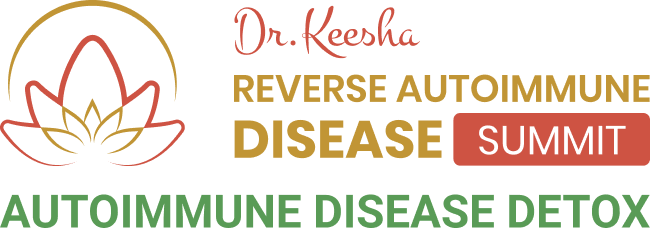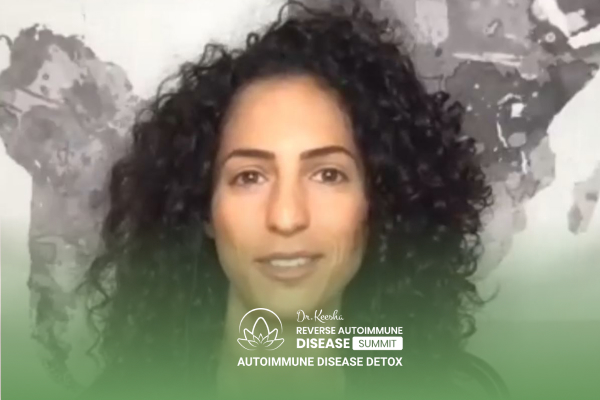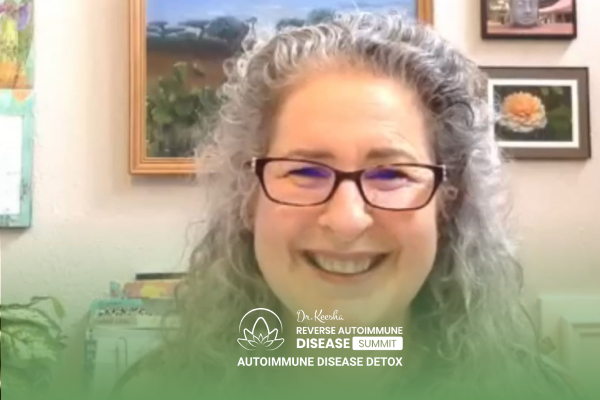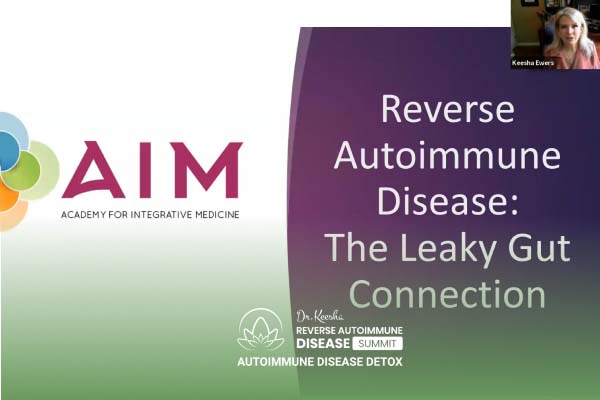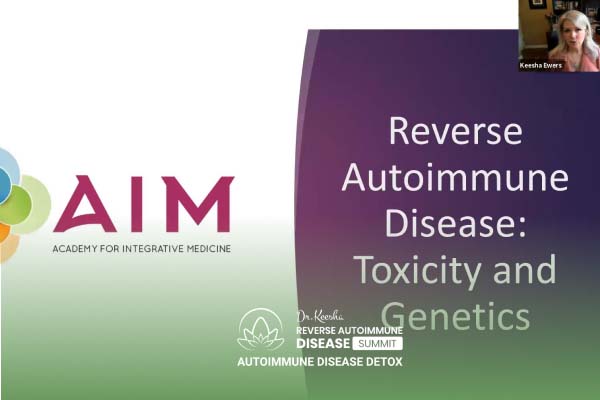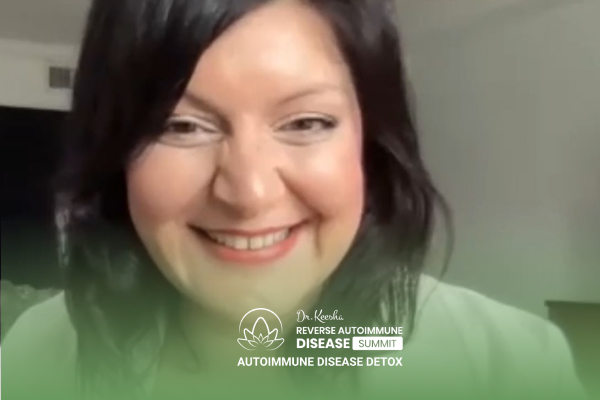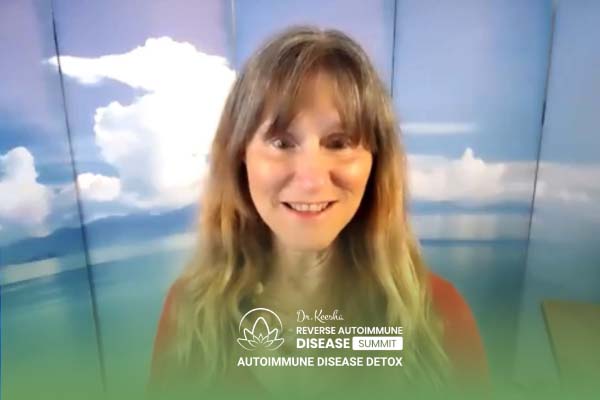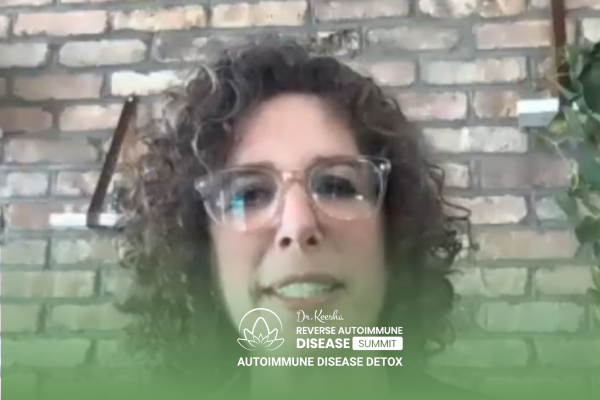Join the discussion below
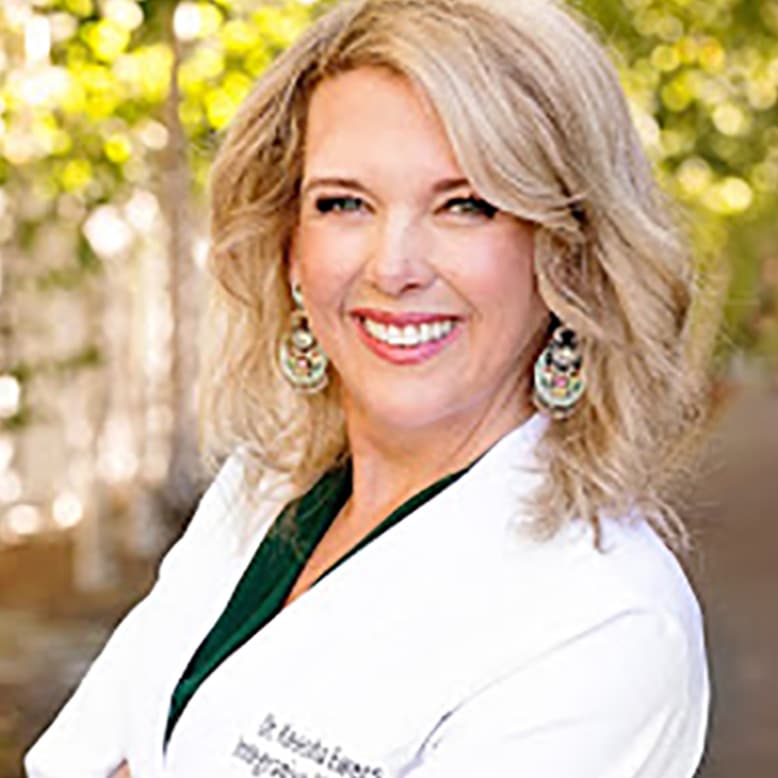
Keesha Ewers, PhD, ARNP-FNP-C, AAP, IFM-C
Dr. Keesha Ewers is an integrative medicine expert, Doctor of Sexology, Family Practice ARNP, Psychotherapist, herbalist, is board certified in functional medicine and Ayurvedic medicine, and is the founder and medical director of the Academy for Integrative Medicine Health Coach Certification Program. Dr. Keesha has been in the medical field... Read More
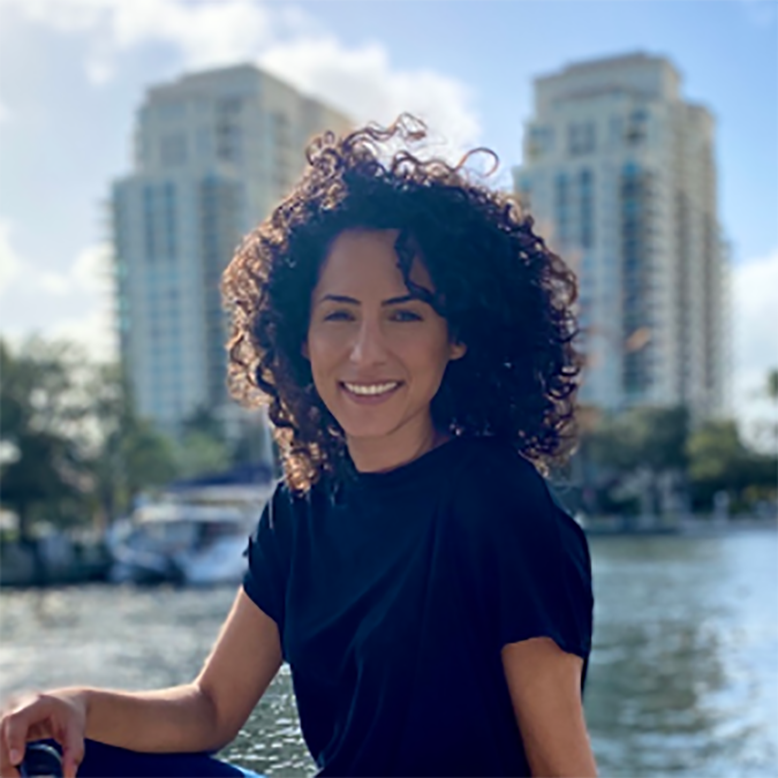
Talia Halberor is a mindset expert. She is a Certified ICF -International Coaching Federation coach, and a certified personal development facilitator. She is the founder of ALFA by Talia and is currently dedicating her life to working with women that are suffering with Multiple Sclerosis in healing their bodies and... Read More
Keesha Ewers, PhD, ARNP-FNP-C, AAP, IFM-C
Welcome back, to the Reverse Autoimmune Disease Summit series, everybody. I’m Dr. Keesha, and this is the fourth iteration of the Reverse Autoimmune Disease series. We’re doing the Autoimmune Detox this time. Of course, we’re working off of those four corner pieces of the puzzle that we have to address, if we’re going to reverse autoimmunity. Which are healing your trauma, making sure that your toxic burden is releasing, making sure that your gut is healthy and then looking at genetics and mitigating any of those that want to express themselves in disease patterns and making sure that they don’t. So in this particular Reverse Autoimmune Disease series, we’re going to be talking about autoimmune toxicity from the spirit, the mind, the heart and the energy body and the physical body. So when we talk about detox, we’re not just talking about green smoothies. And my guest today is really right along this line, and I’m so excited to introduce her to you. Her name is Talia Halberor, and she’s a mindset expert. She’s certified ICF, International Coaching Federation Coach, and a certified Personal Development Facilitator. She’s the founder of ALFA, which is A-L-F-A by Talia, and is currently dedicating her life to working with women that are suffering with Multiple Sclerosis and healing their bodies and improving their lives. And then ALFA stands for Authenticity, Love, Freedom and Abundance. Welcome to this series, Talia.
Talia Halberor
Thank you so much Dr. Keesha. I’m so happy to be here. I’m excited.
Keesha Ewers, PhD, ARNP-FNP-C, AAP, IFM-C
I’m really happy you’re here. I was interviewed by you for your summit and I just remember going, oh, I have to have you. You have such wonderful energy and you’re just very, very heart-centered and open, and you’re along that same path of, we have to heal the whole system. And so, that’s why I invited you to come to this particular series, because our viewers and listeners know exactly what you’re talking about. You’re not having to preach to the choir here. So, I always, whenever I interview somebody, I wanna start with how they got to be doing what they’re doing today. And everybody has a very unique story, and I would love for you to share yours.
Talia Halberor
Yeah, of course. I’d love to. So I was born in Israel, born and raised in Israel. And I don’t know how much our listeners know, but being in the conflict over there as a child, can get scary. And I always told myself that I have to be like a very strong person to deal with that. Like, you wake up in the morning, you take the bus going somewhere. You don’t know if you’re going to… If somebody put a bomb on the bus you gotta jump on. So the fear, the constant fear of like, am I going to be attacked? How can I protect my family? But I’m just a child, I can’t protect anybody. So there was like a lot of thoughts, a lot of fears and a lot of like, I need to be somebody. I don’t know if I even am to survive in this life.
Lots of thoughts about survival. And then I grew up, had my own life experiences. Like my father left. I realized at a very young age, that I’m actually attracted to women and I’m Jewish. That’s wrong. And hearing from my mother, a lot of stories about… I think she was realizing that I might be gay. So she was saying, she didn’t know how to deal with it. She did her best, but she was like said some stuff that really hurt me. Like, oh, those people are sick or stuff like that. So I grew up with a lot of shame, with a lot of guilt. I’m wrong. I’m not good enough. And I was always trying to… I was focusing on the outside cause the inside was not enough for me, in the way I saw it. And so, I grew up, I got to the US, I got married to a man and it’s like nothing was enough. For a time marriage was great. I started a whole new business, learned a new language.
Everything was great. Most people that would look at my life would be, well, I want your life.. Whatever you have there, I want it right now. I want it yesterday. And for me, it was never enough. Nothing was good enough. And there was sadness that was part of everything that I did. And I couldn’t understand why. So at some point, I started my own journey in personal development, and started diving in and asking questions, and finding answers and learning myself. And during this journey, I was diagnosed with MS, Multiple Sclerosis. And well, before the diagnosis, I realized that things are not exactly working. And I ended my marriage, I at some point, closed my business ’cause I realized the difference that this kind of work too for people, so I’m like, I wanna learn it on a deeper level, ’cause if I realized how my life changed. ‘Cause it was like, extreme change. I became super happy. I understand that I had all the answers.
I stopped doing things that didn’t make me happy, that I thought I was supposed to do as a human or a woman in the world. And life just was like, it was amazing. So I start studying it, right? Just to be able to deliver it. And my vision was, if I can understand that I have the choice at every moment, to create the life that I want, to feel how I want to feel, to think the way that actually is supporting the life that I wanna live, everybody can. So I wanna bring this work to Israel. And I want everybody that I love, to see it, to feel it, to experience it, to live it. I was so passionate about it. I think I still am, I can feel it. And I just, I dove in. I left anything else and I dove in, and then at some point, I got the diagnosis and it was really hard.
I’m like, oh my God, I finally thought that I’m in charge in my life. I finally thought that I’m worth something. That life is worth something. And now you’re taking everything away from me. I’m going to end up on a wheelchair. I’m just in my thirties. What’s happening? And of course, with all the work that I was doing, I learned how to manage it. I learned how to deal with it and everyday it was better. It was a journey like everything else in life. And at some point I realized, that when I don’t let my fear, my negative thoughts take my present, take me from the present moment, I’m actually managing really well.
When I started doing the certain practices that I’m actually made up when was teaching people how to do. And I was training them on how to create it in their lives. My MS was changing. It was disappearing. I had nothing. And when I allowed my past, my pain, my fears, my stress to come to the present moment, things were different. So I started like, it was for me, it was new. I was like, oh my God, wait a minute. My mind actually affects my body? What’s happ… Is there a connection? I had no idea at that point there was a connection. It was new for me. And I was so excited about it.
I start studying that, and reading, and I was like, oh my God. I didn’t make it up. It’s real. I mean, is there science behind it? And I really believe that, there is a reason for everything that happened in our lives. So, and we have a purpose, and we have a mission on this planet. And I guess that was my mission. But I needed some… I needed the world to tell me, yes, yes. You’re in the right place Talia. Keep doing what you’re doing. So what happened was, into the trainings that I was in, people with MS start showing up. I’ve never even knew MS was, like existed. MS was a disease, until my diagnosis. And all of a sudden, after I had the realization, that the way that I actually do, changes our body, changes, reverses autoimmune diseases, those people start showing up in my space and they were telling me, “Oh my God, I never felt so free in my body, “since my diagnosis. “I never felt like I can choose everything. “I never felt in charge of my body parts.” I was like, oh my God. Look, there’s a reason. It’s in my space. I get to focus on that. More and more people get to know, get to learn, that they have the power to choose and they can heal. And since then, that’s my mission. That’s what needs to happen this earth. And every day that’s what I focus on. I’m passionate. I love it. And I think that human beings are, we are so powerful. There’s so many opportunities for us. And I want to spread the message. I want everybody to know that.
Keesha Ewers, PhD, ARNP-FNP-C, AAP, IFM-C
So Talia, thank you so much for sharing your story. I find nobody does the work that we do, without having a personal connection to it. And in Ayurvedic medicine, which is one of the things that I discovered after I was diagnosed with rheumatoid arthritis 26 years ago, they say that autoimmune disease is undigested anger. And so when you go back into that space, in your story, I remember kinda sitting back in my chair, looking at the computer screen when I read that and thinking, but I’m not angry.
And then going, oh! Probably my lack of awareness around anger that my body has had to take on, because I have not acknowledged it, given it permission, decided that this was a human emotion that needed to be permissioned and then digested, which means moved through, is maybe why I’m here, right? And so, when you look back and you think about, I had sexual abuse in my past and I had some things that I should have been angry about, but wasn’t. I just sort of put them in a little box and stuck him in the back of the closet. And I can see that. Getting on a bus, not sure if you’re going to get off the bus, you would do the same thing. Because you can’t be governed by fear. So where’s the fear gonna go?
Talia Halberor
Yeah. And I actually unlike you, very clear on the anger that I had.
Keesha Ewers, PhD, ARNP-FNP-C, AAP, IFM-C
Oh yeah. I’m angry.
Talia Halberor
I was angry at the world. I was angry at my mother. I was angry at the family member that touched me in appropriately. My father’s friends had touched me inappropriately. I was angry at myself. Why do I like women? It’s wrong. I’m not supposed to be like that. I was angry and like anything that existed in the world. And I carried it and I expressed it a lot. I actually remember when it came to the US, Israeli people are mostly, tend to be like very passionate, were louder than what you mostly gonna find in the US. And I remember when people were like, whoa, you’re a feisty. And I’m like, no, I’m just having a conversation. So I think it’s a thought…
Keesha Ewers, PhD, ARNP-FNP-C, AAP, IFM-C
I remember being in Israel, I’m thinking the same thing that you’re just saying from the side that I was on as an American born. And then living for a lot of years in Japan, where things are very quiet. And you tiptoe around on rice paper mats and the walls are rice papers. So you’re very quiet and you learned to be… I, as a child, learned to be very demure, right? And then going to Israel, and I was just like, whoa! Uh, huh. And I loved it. I loved it. But it did seem angry to me at first. Like, oh no. Then I was able to start to see threads of passion there, but then I could feel underneath what was infusing that passion. And so, I’m so curious about what rates of autoimmune disease are in certain countries. And it’s interesting that a lot of the numbers that I found, according to different cultural values and habits, a lot of times ones that are expressing anger freely, don’t have autoimmune disease. Which is fascinating to me.
Talia Halberor
Interesting.
Keesha Ewers, PhD, ARNP-FNP-C, AAP, IFM-C
Yeah, it is interesting. So as high numbers as in some places, that it’s not able to be acknowledged, right? So anyway, another thing that I was thinking about when you were talking about this is, when you said I got underneath all of this and then my MS started to change, one of the things I always talk about is, the fact that we’re not ever going to be curing our auto immune disease, we’re reversing it. So that these genetics are still here. My grandfather had RA, right? And they’re still there. I’m not getting rid of my DNA. But the way that it manifests, right? My genetics express themselves, I can actually have something to say in that. And so that if I were to go back to the way that I was when I was 30, and what I ate, and how I managed my… Not managing my anger, that I could actually have RA, probably in six months again. And so, when you think about MS and you said it changed, where are you today with symptoms and things like that?
Talia Halberor
I mean, today’s amazing. I remember the time I couldn’t see. I walked into a wall, realizing, oh my God, I didn’t see this wall. And I just hit it with my face. I lost my vision for a time, I lost the ability to walk. Even after I gained it, I constantly had almost the whole package of MS. So MS really affects different parts of the body. There is severe fatigue. I remember needing to take a break on the roads, stop in the side of the road, ’cause I realized I can’t keep my eyes open. Needing a nap in the middle of lunch, ’cause you just have to have it. Or taking a nap after a shower. Usually shower used to wake me up. Now I need to rest ’cause I had… It was an activity of me. Or numbness. I had numbness, both of my hands. The left hand I could barely use. Numbness in my legs, very weak knees. For example, I was walking with a cane to support me, just in case. And today it’s gone. It’s gone. I mean, of course it’s a whole package. I also eat healthier and I constantly take care of myself. My mind, the work that I do is like, it makes it easier for me. ‘Cause I just like, now it’s obvious, it’s the new way to live. But it just…
Keesha Ewers, PhD, ARNP-FNP-C, AAP, IFM-C
That word constant right there is what I wanted to point to. I’m constantly taking care of myself. And I think that people don’t realize, they sort of think about health as a light switch. It’s either on or it’s off, instead of a spectrum. And autoimmunity is definitely on a spectrum. So, when you think about it that way then, I know if you’ve had trauma in your background and often women will really want somebody outside of them. The little kid part in them, wants somebody outside of them to notice them, and to read them and to be able…
Since I’m caregiving you, you’re going to finally notice me. And then you’re gonna turn around and you’re gonna notice what I need, and you’re going to provide that.
That is an inaccurate myth. And so, I always want to point to the fact that, this is a constant. This is a constant. That you’re not saying, okay, so my symptoms are reversed. Now I can go back and do what I was used to do, or that I’ve arrived, and so now there’s this new normal that I can rest on. The laws of physics say, if you’re not actually pushing forward, there’s entropy. And so, I think about this with autoimmunity too. And in your languaging, as you’re talking, I’m wanting to point that to people like, look, this is… You are that important. You are that important. And so, this idea that I have to constantly be watching my thoughts, watching my own reactions to what life is delivering, not controlling what’s out here, but watching how I interact with it, that is constant.
Talia Halberor
Yeah.
Keesha Ewers, PhD, ARNP-FNP-C, AAP, IFM-C
You slip backwards and start moving into anger or pity, or victimization, or any of those numbers of things that are default settings from childhood, you can get your symptoms back, yeah?
Talia Halberor
Yeah. I mean, I had a really busy slash stressful like a month and a half. And all of a sudden, I had a few days of, I was a little bit confused. I had some brain fog and I mean, in the past I was, oh my God, why is it happening to me? I can’t believe it. Life sucks. Why me? Why not somebody else? Today I’m like, oh my God, thank you for the reminder. I stopped taking care of me cause I made other things, that outside of myself, more important. Thank you for reminding me, that I get to choose myself every day when I wake up.
Keesha Ewers, PhD, ARNP-FNP-C, AAP, IFM-C
And who’s reminding you?
Talia Halberor
Me, the planet, the universe, whatever you believe in.
Keesha Ewers, PhD, ARNP-FNP-C, AAP, IFM-C
This body. This body that people feel…
Talia Halberor
Comes through my body.
Keesha Ewers, PhD, ARNP-FNP-C, AAP, IFM-C
So betrayed by. This body’s not behaving the way I want it to. This body isn’t doing what I want. How come it’s not? How come, how come, how come? This body, this beautiful body is what told you, right? Hello.
Talia Halberor
Wake up, I’m here.
Keesha Ewers, PhD, ARNP-FNP-C, AAP, IFM-C
I need a little attention right here, right?
Talia Halberor
Yeah.
Keesha Ewers, PhD, ARNP-FNP-C, AAP, IFM-C
And so, the body becomes this, its own consciousness, that is delivering data to you, information constantly. And I always think about autoimmunity as a disconnect between, right? Where we’re at war with our systems. And so moving forward toward the body, collaborating with the body, just as it is, even if it’s not functioning the way you want it to. Just turning towards it and saying, how can I serve you? You have served me for… I had my birthday yesterday. For me it’s 56 years. And so it’s like, 56 years this body served me. And of course, I’m not gonna berate it if it’s tired one day. Or, you know what I mean? Or if my knee hurts while I’m hiking, instead of like getting mad about that, I’m gonna sit back and go, what did I eat? You know what I’m saying? What… Okay body, I hear you. Let me just check in again. How can I serve you? How can I appreciate you better? How can I have more gratitude to you? And I always see people and you’d probably see this in your practice too, with autoimmunity, feeling betrayed by their bodies, yeah?
Talia Halberor
Yeah, sometimes. That’s something that I heard a few times, also from my own family, I’m not the only person with autoimmune disorder. So it’s something that I am familiar with. But I wanna bring it back to what you said earlier. The word constant. And show, really discuss about the fact that everything is constant. The question is, are you doing it consciously or is it unconscious? Are you choosing it based on what you want to create or based on the life you thought, you think you got. ‘Cause what I did constantly before I was aware, is telling myself that I’m unlovable, ’cause my father didn’t choose me when I was young or I’m bad, I’m wrong. I’m dirty, cause I like women or that I’m not good enough. All of those things were constant too. It was directing actually every choice, every action that I took everyday, every thought that was in my mind. That was all, this is, all of this is following our beliefs. And I really believed in that. I start thinking those things when I was three years old, of course I believe that it’s all true.
Keesha Ewers, PhD, ARNP-FNP-C, AAP, IFM-C
There’s no child who feels really wounded, is constantly informing what’s going on in your adult perceptual process. And do you want that? I always say, do you wanna give the upset four year old, the keys to your car?
Talia Halberor
Exactly. And this is why it’s constant and it’s a choice. ‘Cause you get to wake up in the morning and you get to start taking actions of the person that you know you are. Not the one you thought you were, based on your past experiences, and start breaking those patterns, that are actually reaffirming everyday, those negative thoughts about yourself. ‘Cause that’s what we’re doing every day. Basically affirming those, like you’re not good enough. You’re stupid. You’re ugly. They’re better than you. And until you stop…
Keesha Ewers, PhD, ARNP-FNP-C, AAP, IFM-C
And then, when a piece of evidence emerges that shows that, see, I knew it, right? And so, you focus on the event or the moment in life that supports that old messaging, as proof positive that what you said was true, and ignore like maybe the 10 other things that prove that it wasn’t.
Talia Halberor
Yeah. And…
Keesha Ewers, PhD, ARNP-FNP-C, AAP, IFM-C
We find the one little thing.
Talia Halberor
I really believe that we are actually creating this, right? It’s not just showing up. ‘Cause whatever I believe in, is there because whatever based on where I grew up, the messages are heard when I grew up, and my past experiences that created a whole set of beliefs. And now, the thoughts that I have are following those beliefs, and then the choice, the feelings, the choices and the actions that I take, are all based on that. So if I believe that, let’s say somebody… I grew up in a house that my father cheated on my mother, okay? For example. So as a child, I’m like, men are evil, men cheat, men betrayed, men are mean.
That’s what I understood as a child. And imagine somebody grows up this way, with these kind of thoughts. And then you’re going to a relationship, let’s say with a man and that’s like to continue this example. But your thoughts are like, men are mean, men are cheat, men betrayed, you can trust men. What kind of relationship you think you’re gonna create out of that? We are always responsible for the results. Both partners are responsible. If it ends in a bad way, it has to do with my thoughts, with my actions, what I created. So I’m creating a scenario in my life, then you’re gonna be like, see Talia, you were right about that. They’re mean.
Keesha Ewers, PhD, ARNP-FNP-C, AAP, IFM-C
Right. And what I’m talking about also is, you can get that thousand foot perspective too. And you can hear a story that says, oh, a bombing just happened in another city, and say, see people aren’t trustworthy. The world is not safe. And yet you have not heard the 10 other stories, that happened in that same moment, in that it may be five mile radius, of people being kind to each other. And so, it really is, we’re going to notice, we’re going to attract and we’re going to create exactly what that little kid, what their meanings and beliefs are, and then there’s your world, right? But then there’s also the world itself happening in response. And then you’re going to pay attention to the places that support your belief system. And so then it just creates the suffering that we feel. It’s so interesting. And the beautiful thing is, we can actually shift it.
Talia Halberor
Yes. And that’s the power. The understanding that, do you want to shift? And do you understand that actually… I mean, it’s hard sometimes to see, but yes, we do have the choice in what to see. We do have to choose what do we want to let into our space? You use the word response that I love. Cause whether I react or respond, is my choice. The world’s not going to change because you’re choosing yourself now. Because you’re choosing to change, to work on yourself. The world’s going like… Bad things are going to keep happening. Some people are gonna keep treating you bad. How are you choosing to process it and to respond, is what actually going to make the difference in your life, on your health.
Keesha Ewers, PhD, ARNP-FNP-C, AAP, IFM-C
And that’s the detoxification process that we’re talking about, when I say autoimmune detoxification. Because sometimes when you get to that place, you will notice there are people in your life and you might have to actually release people in your life, that aren’t following through with coming along in your own evolution and expansion. Yeah.
Talia Halberor
Yeah. I believe that… And a lot of people don’t like hearing that, and that’s okay. We… You said at the beginning, right? We have the genetics and it’s not just the genetics. There’s the expression of our genes, of our cell. And this is your mind. This is where you are here in a way in control. And the fact that people… Like when people hear they’re like, no, no, no, no, no, I didn’t create it. I didn’t do it to myself. Is just another way to bring what we’re familiar with. This anger, that even though it’s negative, it reminds us of experiences and emotions that from our past, but we’re familiar with that. And human beings, we like to feel, there is safe in what we’re familiar with. So we go directly there. And some other people take it to, oh my God, I did it to myself?
Keesha Ewers, PhD, ARNP-FNP-C, AAP, IFM-C
And are you blaming me? That’s about here sometimes. And this is not about blaming.
Talia Halberor
And becoming victim to that. And actually, you can take the exact same message and say, wait a minute. If I created it in a way, I actually have the ability to change it. And the same message, can flip the whole picture, give you so much power. This is an empowering message. I mean, let’s think about it. Some people die from certain diseases because they didn’t realize that. But you have the power to choose right now. Choose yourself, choose to love yourself, choose this process and reverse it.
Keesha Ewers, PhD, ARNP-FNP-C, AAP, IFM-C
My father died last week. And this is airing in April, so in February, on February 15th he died. And it was quite sudden, but he had had cancer. He had had chronic lymphocytic leukemia since 2002. And our journey together, was me working with him on the intense level of anger that he had and his inability to in his own mind, to be able to digest it. And so, over the years he was on chemo first. And then, they changed them to a different chemo. And then about three years ago, he got pneumonia, around Christmas time. And he almost died because the chemo had knocked out. And you can’t take an antibiotic, if there’s no immune system for it to rally with. And the chemo had just knocked out everything.
And so there was, he was on like five rounds of antibiotics that they put him on, and nothing. So he finally came to me and he said, all right, I am now hearing what you’re saying. It was really a death’s door, three years ago. And I said, okay dad. And he said, “I’m listening. “I’ll do anything.” I said, it’ll be hard that you’re going to have to do some heavy lifting mentally. And he said, “I’m ready. “You’ve been talking to me about this for years. “And we’d been kind of doing it very, very slowly “and it’s obviously not fast enough.” And that was amazing because, in that moment, I saw it in his eyes like, oh yeah, all of this anger that I have not been willing to really get rid of, to jettison, I can feel it.
Like he could just feel it in his body for the first time. And then, the antibiotics not working, he couldn’t breathe. And he felt like he was really being buried underneath all that anger. And so, for over the last three years, we had the most remarkable, oh, so many amazing experiences, as he really started getting underneath this. And he was chemo free for all that time. His cancer went into remission, after almost, it was 15 years he had had it. So, this is the kind of power that we’re talking about, when you really start talking about the power of the mind. It’s not just willing your… In fact it isn’t even, willing yourself better. It’s not saying, I want to be better. It’s saying, what is it that’s happening inside of my circuitry, that’s creating dis-ease inside of this body? That’s a whole different thing rather than mind over matter, right?
Talia Halberor
Yeah. And I mean, I think, and I’m relating to what, I can understand what you’re saying right now, whether it’s a few years, cause the part of it that is unconscious, that is part of our daily life, is stress. Like that’s constant. Even if we don’t like, oh my God, I feel stressed right now, our mind is always creating stress, besides what’s already happening. Like think about COVID. That’s stressful. Will like die tomorrow? Am I going to get it? I’m I going to be in a hospital?
Keesha Ewers, PhD, ARNP-FNP-C, AAP, IFM-C
Right. Global stress right now.
Talia Halberor
That’s why it’s so stressful.
Keesha Ewers, PhD, ARNP-FNP-C, AAP, IFM-C
Right.
Talia Halberor
And then your thoughts from the past. The anger or I’m not good, or any beliefs that are not supporting you. 95% of our thoughts every day are actually the same thoughts that we had yesterday, the same thought that we had yesterday, the day before. So imagine, cause most of those beliefs are really negative. They’re really hurtful. There’s some stuff we would never tell anybody else, but we tell ourselves. So everyday you put yourself down like this. You don’t really think you’re somebody that can deal with whatever shows up in this lifetime. So the stress is like happening inside constantly. And I mean, I believe that all the listeners know this part, it’s like, stress really shuts down our immune system.
Keesha Ewers, PhD, ARNP-FNP-C, AAP, IFM-C
Right.
Talia Halberor
Our bodies can deal with stress. It’s genius. You can’t just… It’s designed to work and deal with everything. But the level of stress that we’re creating with our minds, that’s too much. So like it has to compromise something. Our immune system is been compromised, and here is the reason why autoimmune exists. While the doctors say, we don’t know what is the reason, but here take some medication and solve it.
Keesha Ewers, PhD, ARNP-FNP-C, AAP, IFM-C
Well, and I want to point to also, it’s not just us having negative belief patterns against ourselves, but also being critical of outside of yourself. That’s just a reflection, because outside of yourself, is you. And so that, that was one of the things that I was really working with my dad on is, he would get so, oh my gosh, politics, whoo! He would be so angry. And this past election, I am convinced he lost his own battle. And that’s probably why he had a hemorrhagic stroke. He just could, he was just like, “I can not deal with this.” And I said, well, you’re saying the words right now. I can not deal with this, right? And so, he made his own choices, about how he wanted to deal with that.
But I mean, I would just say, if you find yourself critical of any group of people, of any political thing of the world, of God, of life, of anything, then turn it off. I would always say, just turn it off, put the magazine away. My parents don’t have a TV. So it’s not like they could literally use a remote and turn off the news. But like put down your reader, put down the magazine, put down the book that’s talking about this. And is that really making you happy? This whole engagement that you’re having with it. And is it changing anything in the world? It is not. But it is changing your body. And when this all happened, my mom, she just kinda said, you were right. You were saying, this is going to happen, if he does… If he cannot get underneath that. And he was just so angry.
And he’d gone through this really beautiful period of time where he was peaceful. No chemo, super healthy and then this happened, right? So it is kind of fascinating, if you can observe that in yourself and notice like, where am I critical? I’m I critical of me, I’m I critical of something else, that bitterness and that resentment, and that rumination on the same thoughts over and over again. I’ve heard this statistic 94%. And so I’ll say, somewhere in there, there is 6% of new thought, and of that 6%, those are not always gems either. You let it be still long enough to search through the 6% and find what you really wanna focus on and create it, right?
Talia Halberor
Yeah. I mean, here’s the thing. We interpret everything. We give some meanings to whatever it is that is real outside of us, right? That’s always what we do. We don’t really experience reality. We see reality, something happens, there are facts outside, but we give it some meaning, and this is what exists in our personal reality. And these kinds of situations like you’ve said, for me the work I do, at least and I believe in, this is a sign. This is for me showing me this is where work gets to be done. If there is anger, if something is me off, if I have any certain emotions showing up, it shows me that something is still not resolved there. And that’s where you get to, yes, you want to make sure this doesn’t exist too much in your life if it triggers something that’s like, it puts you in stress or it affect you in a negative way.
But when you do the work and you wanna start solving and learning about yourself, cause it’s all about learning. Like who am I really underneath this? This is where to work, the work is. I believe that love is healing. I believe that authenticity, when we come back to our authentic self, who you were when you were born. A loving creature that trusts everybody and loves everybody. And there’s like, nobody is mean, nobody is here to hurt you. This is where our healing is. That’s why ALFA, you said it in the beginning, it stands for Authenticity, the Love, Freedom and Abundance. ‘Cause all of this is there available for us when we connect to that part of us, and this is where you will find your healing, when you find a way to access that. So everything in your life, everything that happened, everything that triggers you, shows you, hey, this is actually where you get to stop. Look and heal and move.
Keesha Ewers, PhD, ARNP-FNP-C, AAP, IFM-C
Right. And if also, if it’s making you angry, it’s some part of you that you’ve actually disowned about you. I used to say that to my dad, when he’d get red-faced I’d say, you actually kinda look like the guy you’re angry about right now. He would go
Talia Halberor
I’m I getting even more angry right now?
Keesha Ewers, PhD, ARNP-FNP-C, AAP, IFM-C
I know. And then he would go, okay. And so that’s a really important thing to remember is, whatever we’re angry about, we’re actually becoming that which angers us. So that’s a beautiful piece of that is, everything is a mirror. Everything is a mirror, including your disease process, right? It’s a mirror just reflecting back something that needs attention. So… And it needs love from you. And that’s always going to be the answer. Always going to be the answer, right? Anything that’s seeking… The toddler that’s pulling on your pants and saying, mom, mom, mom, mom, they’re wanting love. Your body that’s pulling on your pant leg and going, hey, hey, hey, hey, they want love, right? The whole thing is all about that. So jumping back into that and really loving yourself fully, that’ll take care of it. That’s so beautiful.
Talia Halberor
Absolutely. I feel like all the answers are right there. It’s not that easy to do sometimes, we didn’t treat ourselves most of our life this way, but like, we can all start now.
Keesha Ewers, PhD, ARNP-FNP-C, AAP, IFM-C
We can all start now, with every single new thought. So where can people… I’m sure you probably have a exercise, people could start right this minute.
Talia Halberor
Yes. It can sound a little bit general. But for me, this is number one for anybody who really chooses to make the change from within. And that’s something surfacey that will go away as soon as it comes in. I think the answers are in the questions. So starting and being curious like now, is where you’re going to find the growth and the healing. So for example, if you’re noticing… It’s actually connecting perfectly to what you just said. If you’re noticing that you’re upset, you’re sad, you’re hurt from something that somebody said to you, you don’t have a result that you wanted to get in something, work, school, whatever it is, stop.
Every time you recognize a negative, sort of a negative feeling, stop and ask yourself why. Not why from a place of blaming, this is really important. Why from a place of, what is the source? And the more you ask and the more authentic… You need to be really real with yourself, ’cause you’re either gonna show up and be like, playing it’s part and trying to pull you away from the truth, ’cause it loves for you to stay small and not grow.
Keesha Ewers, PhD, ARNP-FNP-C, AAP, IFM-C
It’s their fault. It’s not yours.
Talia Halberor
Yeah. Yeah. So from a place of responsibility, try to understand what really is underneath all of that, that created this outcome. And if you go deep enough, you’ll understand, there is some belief that you probably most of your life, thought that is an absolute, but it’s not. It’s a belief you created because something that happened in your life and you find this belief, you’ll start understanding what to get to work on. Because all the beauty in this work, and the most challenging part at the times, is actually the awareness.
Once you are aware of your patterns and their source, and understand that, all of it is a bullshit lie you’ve been telling yourself unconsciously your whole life, you know when it shows up, how to make a different choice. Choice is easy to make when you see the picture.
But unless you have awareness in a moment, you don’t even have the ability to choose differently. And then when you start breaking the patterns that you actually created in your life, because of your past beliefs and those painful things you’ve been telling and thinking, this is what you need to break. Once you start breaking this, you basically start creating the person that you choose to be, you want to be. Not that you thought you were born to be. So ask yourself the questions, understand the source and then make a new choice.
Keesha Ewers, PhD, ARNP-FNP-C, AAP, IFM-C
I have an example of this. Last night we were sitting at my mom’s, I have one brother. And we’d been working as a team, getting everything… That just really figured out and done and had come together. I hadn’t seen him for a couple of days ’cause I came back home and started going to work. And so, last night we went over and had dinner and my brother just, he had this weird energy about him. He was really tight in this energy and so I said, what’s happening for you? Are you okay? And he said… And he just kind of exploded. “I don’t trust you!” Then I went, oh. And so, in my old pattern, my little kid part would have run away and just like zoop! ‘Cause this was an unpredictable behavior. And so instead, asking questions like, oh, why do you feel safe right now? Like to this little kid.
This is your brother, he’s having a moment. It’s okay. I’ve got you. You don’t need to be out here, I’ve got it. 56 year old’s here, not four year old, right? And so, I just really acknowledging her first and her feelings, and giving her some empathy, and yeah, this is hard to manage. This is unpredictable. It’s okay. I’m here, okay? You don’t have to manage it. And then just turning to my brother and saying, what’s happening for you? Like what’s going on? And he just sort of went through this thing and it was based on a 16 year old version of me, which was 30 years ago. And so, he had this thing that was going on for him, that was 30 years old. And so, if I could talk to my little kid-self and be okay, I asked him to do the same thing, right? And so, over a period of time in this conversation, he got it.
I’m being completely irrational. This is about me. This isn’t about you. I probably need to go to therapy and really work with this little kid part of me. That was our outcome, which was beautiful. Instead of a bunch of drama, right? Instead of a fracture in the relationship, instead of… ‘Cause there’s nothing like death in a family for drama stuff to start happening, right? And so being able to do that, where you can acknowledge, why am I reacting the way I’m reacting? Not this person’s being an asshole, therefore I have a right to act how I’m acting. That’s the question right there, right? Why am I having the response I’m having? It’s nothing to do with them. And so, that right there is freedom.
Talia Halberor
Exactly. And something that’s really important, whether you do it alone or you have somebody that’s like coaching you, or directing you, or mentoring you, have compassion.
Keesha Ewers, PhD, ARNP-FNP-C, AAP, IFM-C
Yeah.
Talia Halberor
The fact that you today choose yourself, that’s a win, that’s a huge win. And yes, there are going to be pain dealing with past pain, but allow everything to come up and just slow yourself. Everything is going to be fun there already.
Keesha Ewers, PhD, ARNP-FNP-C, AAP, IFM-C
Right. And even if it’s not, you are going to be okay, as long as you continue to love the process and have compassion for it. And at the end when I left, I said, I don’t even care about any material objects. I care about you. Our relationship is the most important. And that was for him to be able to hear that, ’cause the 16 year old version of me would have never said that to him. So then he could start to love himself and not feel shame for his responses. So the more that you can kinda stay present to the why that Talia is saying, that’s really the key question. Why am I responding the way I’m responding? Who is it? How old is she? What’s happening in there? Yeah.
Talia Halberor
And specifically for autoimmunity, I think the people that are dealing with that, they want to reverse that, I think that’s a powerful tool because it connects… And this gonna happen also without like, it’s those conversations that happen underneath our awareness. You’re giving yourself a lot of power. You’re basically telling yourself, I can deal with that, which can create a feeling of, I can also heal my body. I can also be in charge and take responsibility of my genes, of my genetics, of the way my body acts, which I know that a lot of people lose they’re like, I’m not in charge of anything anymore. And it makes you feel very like powerless.
Keesha Ewers, PhD, ARNP-FNP-C, AAP, IFM-C
And if I can stay present with pain that’s emotional, then I can stay present with physical pain. And I can listen to it, then it can shift. But if I leave the building the second I have physical pain, and feel despair and go down into an emotional abyss, my physical pain is gonna get much worse. So these are tied. In hospice work, this was really profoundly apparent. The more emotional pain someone had, the more pain medication it took for their physical pain to be alleviated. I mean, these are so connected. Emotional pain is the number one cause of physical pain.
Talia Halberor
Yeah. Our mind and body are just, it’s one unit. We just…
Keesha Ewers, PhD, ARNP-FNP-C, AAP, IFM-C
One unit.
Talia Halberor
We don’t learn it as the truth and then it takes time sometimes for people to just choose to believe in that. But the more… The faster, you see it, the faster you see results and change in your body.
Keesha Ewers, PhD, ARNP-FNP-C, AAP, IFM-C
I so appreciate you taking time. Thank you so much. And for those of you that are coaches, one of the things I have not read in Talia’s bio is that, she has a group called Namaste Bitches. Which I absolutely love the naming of that. And you can find her at the links that we’re putting here with her talk. So alfabytalia.com and her Facebook is also ALFA by Talia. Thank you so much for taking the time today Talia, and sharing your wisdom with everyone.
Talia Halberor
Absolutely. I really enjoyed it, and thank you for what you do. I’m so grateful that work like this is been done in our world.
Keesha Ewers, PhD, ARNP-FNP-C, AAP, IFM-C
You too. All right everybody, until next time. Be well.
Downloads
